by Lisa Cooke | Jun 18, 2013 | 01 What's New, FamilySearch, Irish, Records & databases
 If you’ve got Irish roots and haven’t started exploring them, check out Irish Genealogy, recently re-launched by Ireland’s Department of Arts, Heritage and the Gaeltacht. Beginners rejoice: you can read the site in English and there are helpful links on the lower left to introduce you to Irish research and records and to explain how the site works. You can search indexes to church records, the 1901 and 1911 census, tithe records, soldiers’ wills, the Ireland-Australia database and more.
If you’ve got Irish roots and haven’t started exploring them, check out Irish Genealogy, recently re-launched by Ireland’s Department of Arts, Heritage and the Gaeltacht. Beginners rejoice: you can read the site in English and there are helpful links on the lower left to introduce you to Irish research and records and to explain how the site works. You can search indexes to church records, the 1901 and 1911 census, tithe records, soldiers’ wills, the Ireland-Australia database and more.
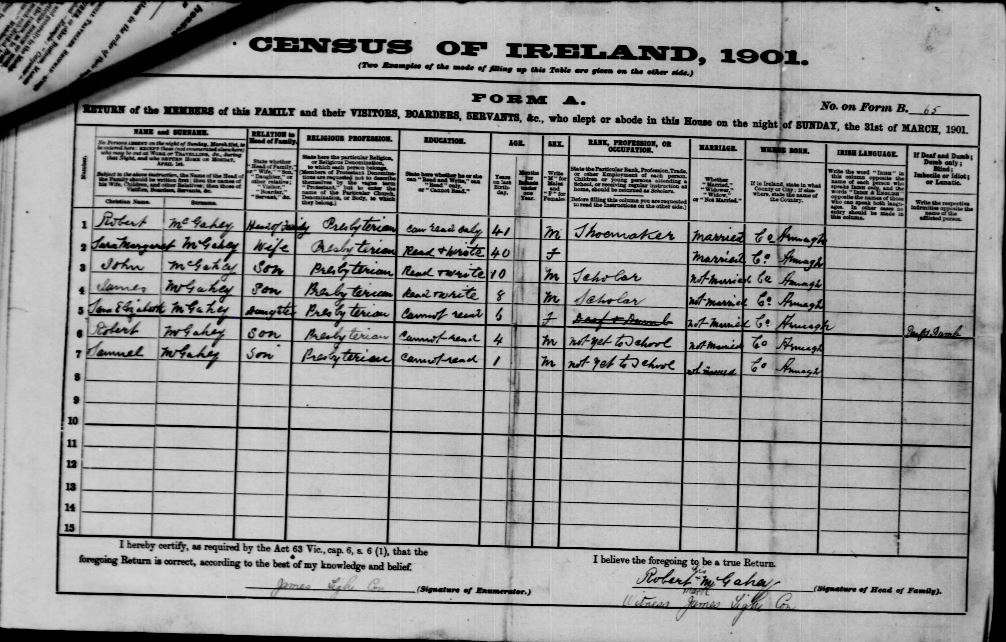
Irish census, 1901, sample image from Irish Ancestors website.
According to Dick Eastman, the Irish government plans to put its own indexes to birth, death and marriage records (back to 1845) on the Irish Genealogy website. FamilySearch currently has an index to 23 million Irish Civil Registrations (1845-1958), which includes births, marriages and deaths, but excludes records for what became Northern Ireland after 1922. (They’ve also got lots of Irish court, tithe and prison records, too.)
It isn’t always easy to find your Irish ancestors–you may need to call on that proverbial Irish luck–but websites like these may very well be your own ancestral pot ‘o gold.
by Lisa Cooke | May 3, 2014 | 01 What's New, Brick Wall, Google, Inspiration
Cold Case files are as common in genealogy as they are in criminal investigations. So it seemed a no brainer to me that family historians could 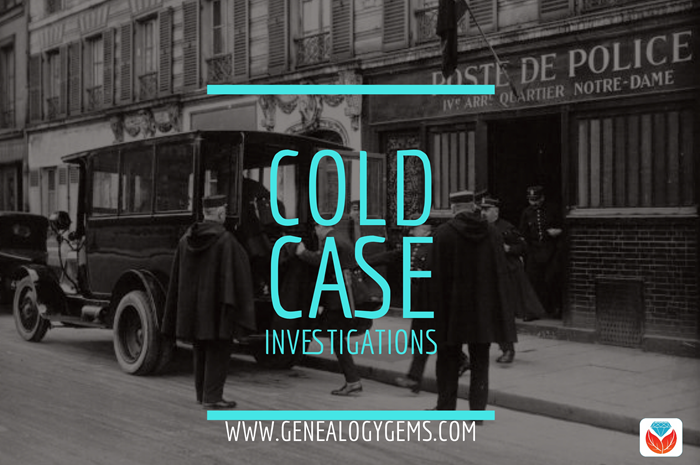 incorporate some of the same techniques that cold case investigators use. And that is how my presentation How to Reopen and Work a Genealogical Cold Case was born.
incorporate some of the same techniques that cold case investigators use. And that is how my presentation How to Reopen and Work a Genealogical Cold Case was born.
I recently brought this exciting hour to the folks at the Williamson County Texas Genealogical Society and they embraced it with open arms. Eyes were lighting up, and there was excitement in the air at the prospect of pulling some of those dusty old brick walls off their genealogical office shelves. I warned the group that they would be blaming for a sleepless night that night as they burned the midnight oil putting the tips to work. And as always, I encourage them to let me in on their successes by dropping me an email. I never cease to be amazed at what my wonderful audiences accomplishes!
An email from Teresa Hankins of Round Rock, TX landed in my inbox the very next morning, and her message was inspiring:
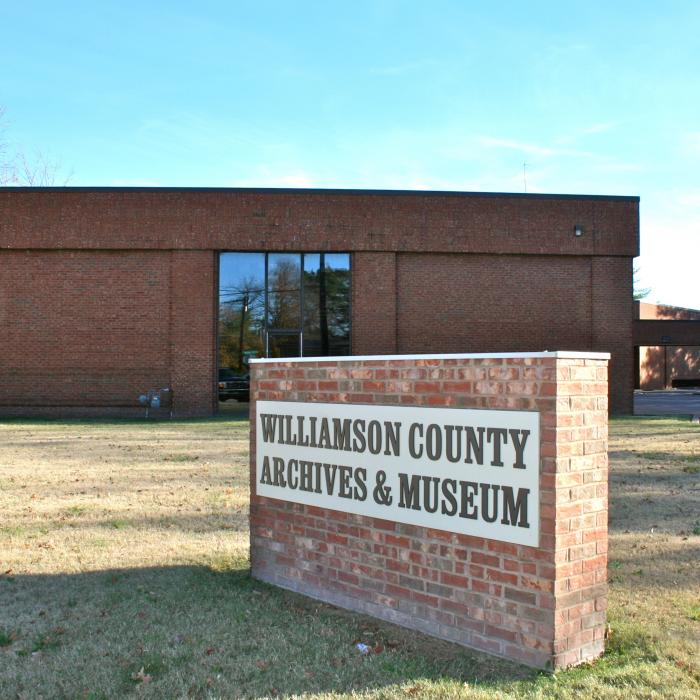 “I attended your lecture on Genealogical Cold Cases at the Williamson County Genealogical Society’s meeting just last night. It was late when I got home, but I wanted to check out some of your suggestions on cracking hard cases. I was particularly interested in Google Books, as I had just recently discovered it, but hadn’t used it much.
“I attended your lecture on Genealogical Cold Cases at the Williamson County Genealogical Society’s meeting just last night. It was late when I got home, but I wanted to check out some of your suggestions on cracking hard cases. I was particularly interested in Google Books, as I had just recently discovered it, but hadn’t used it much.
The Case: My 2nd great-grandfather, Joshua, was too young to serve in American Civil War, but he had nine brothers who did serve. These brothers are what first prompted my interest in genealogy, and I’ve spent untold hours reconstructing their movements and histories.
One of the most poignant stories is that of David, the youngest of the nine. He couldn’t have been more than 17 years old when he joined the Union regiment. He was wounded at the Battle of Lone Jack, discharged, and then married Margaret, a young lady from a neighboring farm. They had one child, named Thomas, and then David was murdered by bushwhackers. His young bride remarried and had two more children before she, too, passed away at a young age. My unsolvable case was with Thomas, son of David and Margaret, who seemed to vanish from history. He lost his father when he was an infant, his mother when he was about 12, and I wanted to know what happened to him!
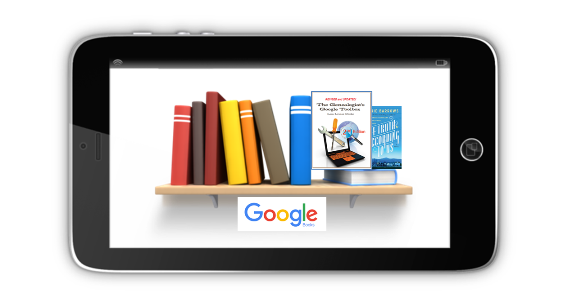 Like all good genealogists, I was only going to research a little before going to bed. I wanted to play around on Google Books and see how the searches worked. I typed in a few key words that were unsuccessful before settling on a group of books based on Benton County, Missouri, which is where most of my ancestors in this line resided. I was just clicking on a book and searching for the surname, not looking for anything in particular. I only wanted to see what would come up and how the search engine worked. The next thing I know, I am looking at a record from the Supreme Court of Missouri, regarding some sort of land dispute. There are all the names involved, Thomas, his two half siblings, another family that I know are neighbors and relatives! I now know the month and year that Thomas died. I know that he sold some land one of his uncles. He was living there among family and friends, and though he, too, died young, at least I know what happened! This has opened up a cold case, and now it is on fire with new leads. I can’t wait to see what else I can dig up on Google Books!
Like all good genealogists, I was only going to research a little before going to bed. I wanted to play around on Google Books and see how the searches worked. I typed in a few key words that were unsuccessful before settling on a group of books based on Benton County, Missouri, which is where most of my ancestors in this line resided. I was just clicking on a book and searching for the surname, not looking for anything in particular. I only wanted to see what would come up and how the search engine worked. The next thing I know, I am looking at a record from the Supreme Court of Missouri, regarding some sort of land dispute. There are all the names involved, Thomas, his two half siblings, another family that I know are neighbors and relatives! I now know the month and year that Thomas died. I know that he sold some land one of his uncles. He was living there among family and friends, and though he, too, died young, at least I know what happened! This has opened up a cold case, and now it is on fire with new leads. I can’t wait to see what else I can dig up on Google Books!
Thank you for all the useful information you shared. I learned so much. I can’t wait to try out your other suggestions. You said to send you an email if we cracked a cold case, and that is what I’m doing. Have a blessed day!”
Well, I feel blessed every time I hear from my fabulous students / listeners / readers! I’m a lucky girl!
And I received one more blessing in Round Rock: At long last I finally got to meet my cousin Carolyn. You “met” Carolyn on the free Family History: Genealogy Made Easy podcast episodes about contacting living relatives (see below for links.) Carolyn and I have been collaborating online for nearly ten years on our family history (her mother is my Grandmother’s sister) but we never had the opportunity to meet in person until now. She’s as sweet and warm as she is on the phone – it’s not wonder she has such great success reaching out to family relations.
It’s wonderful to hear from folks about how they have benefited from something I’ve shared, but I could write volumes on the blessings I’ve received in this job that I love.
Heritage Quilts Video with Carolyn: featuring a quilt in our family. Each block features one of our female ancestors.
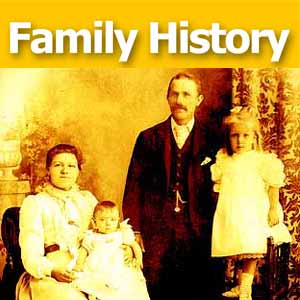 Episode 14: How to Contact Long-Lost Relatives
Episode 14: How to Contact Long-Lost Relatives
Connecting with someone who knows about our ancestors can really boost our research results—and even create new relationships among living kin. But it’s not always easy to send that first email or make that first call. In this episode, we chat with my cousin, Carolyn Ender, who has mastered the art of “genealogical cold calling” by conducting hundreds of telephone interviews. She has a knack for quickly connecting with folks she doesn’t know over the telephone in ways that put them at ease and bring to light the information that she’s looking for.
Episode 15: More Tips for Contacting Distant Relatives
In this episode we talk more about “genealogical cold calling” with my cousin, Carolyn Ender, who has conducted hundreds of telephone interviews. Relationships are key to genealogical success and by following 14 genealogical cold calling strategies you will find your research relationships multiplying.

A one hour video of Lisa’s class on Genealogical Cold Cases is part of Genealogy Gems Premium Membership. Click here to become a Member.
by Lisa Cooke | Dec 10, 2014 | 01 What's New, Evernote
Recently Richard wrote in with great questions on using Evernote for family history. “Thank you for ‘reinvigorating’ my interest in my family history,” he says. “I watched [your Legacy Family Tree webinar] on Evernote twice and I am now a Premium user thanks to the video. I’m following many of your suggestions, but have a few questions.”
Here’s our Q & A on using Evernote for family history:
Q: “Creating a set of useful tags assumes that in the future you will want to extract data based upon those tags. Since in many cases you don’t have the data yet, and can’t know what you want to retrieve (kind of a “Back to the Future” scenario), do you have any suggestions on specific tags? Here are a couple I’m thinking of using and I’d appreciate your opinion: Census year — Birth year – Death year – Civil Records – Church Records.”
A: Yes, I provide a list on my Evernote for Genealogists quick reference guide (out of print) that follows along the lines you are already going (focusing on record types). I recommend keeping tag names simple so there is less clutter in the left hand column of Evernote. i.e. Birth, Census, Death, Immigration, etc. I also tend to have location tags such as states and/or counties in anticipation of opportunities to do research in those areas. If I’m going to make a trip to Randolph County, it would be convenient to access all related notes regardless of family or time frame with one click of a tag.
Originally I created notebooks for each major surname in my tree, but I recommend tags now. I reserve notebooks for high level topics and projects—particularly projects I anticipate wanting to work with others on. It’s very convenient to simply share a notebook. There are five Evernote videos that are part of Premium membership that go in to all the details. You’ll find the list here.
Q: “Do you tag individual surnames in your notes? What about generations, i.e., Grandparents — Great-Grandparents — Great-Great-Grandparents, etc.”
A: I have laid out my organizational strategy in the Genealogy Gems Premium Membership videos “Hard Drive Organization” and have since elaborated on how I apply that method to Evernote in several Premium podcast episodes.
Q: “I noted in your video you do not clip most of your family photos. Do you clip full census sheets?
A: Yes. Anything to do with my research!
Q: I use Family Tree Maker, and subscribe to Ancestry.com. Once you have compiled all these notes, what and how do you include them into your tree?”
A: I cover this in Premium episode 96.
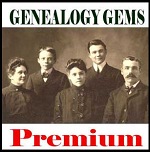 As you can see, though I cover a lot of Evernote questions on my free Genealogy Gems website, a lot of his more detailed questions are addressed in members-only Premium content. Learn more about Genealogy Gems Premium membership here: all the great online videos and Premium podcast episodes you’ll be able to access for a full YEAR for less than the price of attending a single day at a genealogy conference!
As you can see, though I cover a lot of Evernote questions on my free Genealogy Gems website, a lot of his more detailed questions are addressed in members-only Premium content. Learn more about Genealogy Gems Premium membership here: all the great online videos and Premium podcast episodes you’ll be able to access for a full YEAR for less than the price of attending a single day at a genealogy conference!
Just interested in Evernote right now? Check out this post:
How to Get Started in Evernote, and the Ultimate Evernote Education
by Lisa Cooke | Jun 4, 2015 | 01 What's New, Family Reunions, Google, History, images, Newspaper, Technology, United States, Video
 It’s common to hear of long-lost relatives who rediscover each other online or through DNA tests. But nearly 100 years ago, another new technology–the radio–united a pair of long-lost siblings 40 years after one ran away.
It’s common to hear of long-lost relatives who rediscover each other online or through DNA tests. But nearly 100 years ago, another new technology–the radio–united a pair of long-lost siblings 40 years after one ran away.
This newspaper article reports that Alonso Jones’ children were sitting around one day in 1926 listening to the radio. Then they heard the announcer say, “Alonso Jones, wherever you are, listen…Your sister wants to see you at Worthington, Ohio. She has not seen or heard from you in forty years. You were born at Antiquity, Meigs County, Ohio, at the time of the Civil War….”
“You were reared by Captain William Roberts, an Ohio River flat boat man. You went with him on a produce boat when you were a boy and ran away while the boat was lying at the bank in Arkansas.” The article reports that the man telegraphed his sister and arranged to meet her. What a great story! And what a great family history find for anyone researching Alonso Jones or his sister, Mrs. Robert Eakin, or his guardian, William Roberts!

Salt Lake Tribune, January 1, 1926, p. 1. Digitized at Ancestry.com.
This article illustrates two fantastic tips for newspaper searching.
FIRST, I originally found this article in the Salt Lake Tribune, digitized at Ancestry. I was struck because the story was about people from Ohio and Arkansas–not Salt Lake. As we still see today, local news stories of the past were often reported in other cities. When searching digitized newspapers, don’t automatically discount search results that otherwise seem right but appear in out-of-town papers.
SECOND, curious about this story, I used Lisa’s search strategies from her book, The Genealogist’s Google Toolbox to search for more information about the people mentioned in the article. I got a hit on a possible match for the riverboat caption. I also found that the Google News Archive had this same article in The Evening Independent in St. Petersburg, Florida (shown above). The copy above is much clearer to read and slightly different. For these reasons, it can sometimes be worth looking for duplicates of news articles and/or obituaries for your relatives.
 Want to learn more? Genealogy Gems Premium members can also listen to Premium podcast episodes GGP 36 and 3GGP 37 about newspaper searching (Lisa talks about Google News Archive in episode 37). Or get the ultimate scoop in How to Find Your Family History in Newspapers! It’s packed with inspiring family history finds in the newspaper and all the tools you need (online and offline) for finding your own.
Want to learn more? Genealogy Gems Premium members can also listen to Premium podcast episodes GGP 36 and 3GGP 37 about newspaper searching (Lisa talks about Google News Archive in episode 37). Or get the ultimate scoop in How to Find Your Family History in Newspapers! It’s packed with inspiring family history finds in the newspaper and all the tools you need (online and offline) for finding your own.
by Lisa Cooke | Jun 26, 2015 | 01 What's New, Ancestry, Google, images, Military, Newspaper, Records & databases, United States

Every Friday, we blog about new genealogy records online. Do any of the collections below relate to your family history? This week seems to be all about U.S. records: newspapers, military and railroad employees.
U.S. NAVY SURVIVORS. A new collection with nearly 2 million records from case files of Navy approved pension applications (1861-1910) is now searchable on Fold3. These include Civil War survivors and later Navy veterans.
U.S. NEWSPAPERS. Over 450 historical newspaper titles for all 50 states (1730-1900) have been added to GenealogyBank. Over 160 of the papers date to the 1700s. Notable are an Ohio (Northwest Territory) paper from 1795, a New Orleans paper from 1803 and a Detroit paper from 1817.
PENNSYLVANIA NEWSPAPERS. Notable recent additions at Newspapers.com include nearly 400,000 pages of the Wilkes-Barre Record (1881-1949PA) and over 400,000 pages of the Standard-Speaker (1961-2000, Hazleton, PA).
U.S. RAILROAD RECORDS. Ancestry subscribers can access the Chicago and North Western Railroad Employment Records, 1935-1970. The line passed through Wisconsin, Minnesota, SD, Iowa and Nebraska. The collection includes Social Security numbers (born before 1912) and applications (with parents’ names), birth and death date, residences and occupational details.
 Google search tip: Though no longer actively digitizing and indexing newspapers, Google News Archive can help you locate online content for specific newspapers. Click here to access its alphabetical listing of newspapers. You can also enter keyword-searches in the search box on that webpage for all the newspapers listed here. There’s an entire chapter on the Google News Archive and what it can still do for us in The Genealogist’s Google Toolbox by Lisa Louise Cooke, fully revised and updated in 2015.
Google search tip: Though no longer actively digitizing and indexing newspapers, Google News Archive can help you locate online content for specific newspapers. Click here to access its alphabetical listing of newspapers. You can also enter keyword-searches in the search box on that webpage for all the newspapers listed here. There’s an entire chapter on the Google News Archive and what it can still do for us in The Genealogist’s Google Toolbox by Lisa Louise Cooke, fully revised and updated in 2015.
 If you’ve got Irish roots and haven’t started exploring them, check out Irish Genealogy, recently re-launched by Ireland’s Department of Arts, Heritage and the Gaeltacht. Beginners rejoice: you can read the site in English and there are helpful links on the lower left to introduce you to Irish research and records and to explain how the site works. You can search indexes to church records, the 1901 and 1911 census, tithe records, soldiers’ wills, the Ireland-Australia database and more.
If you’ve got Irish roots and haven’t started exploring them, check out Irish Genealogy, recently re-launched by Ireland’s Department of Arts, Heritage and the Gaeltacht. Beginners rejoice: you can read the site in English and there are helpful links on the lower left to introduce you to Irish research and records and to explain how the site works. You can search indexes to church records, the 1901 and 1911 census, tithe records, soldiers’ wills, the Ireland-Australia database and more.

 incorporate some of the same techniques that cold case investigators use. And that is how my presentation
incorporate some of the same techniques that cold case investigators use. And that is how my presentation  “I attended your lecture on Genealogical Cold Cases at the Williamson County Genealogical Society’s meeting just last night. It was late when I got home, but I wanted to check out some of your suggestions on cracking hard cases. I was particularly interested in Google Books, as I had just recently discovered it, but hadn’t used it much.
“I attended your lecture on Genealogical Cold Cases at the Williamson County Genealogical Society’s meeting just last night. It was late when I got home, but I wanted to check out some of your suggestions on cracking hard cases. I was particularly interested in Google Books, as I had just recently discovered it, but hadn’t used it much. Like all good genealogists, I was only going to research a little before going to bed. I wanted to play around on Google Books and see how the searches worked. I typed in a few key words that were unsuccessful before settling on a group of books based on Benton County, Missouri, which is where most of my ancestors in this line resided. I was just clicking on a book and searching for the surname, not looking for anything in particular. I only wanted to see what would come up and how the search engine worked. The next thing I know, I am looking at a record from the Supreme Court of Missouri, regarding some sort of land dispute. There are all the names involved, Thomas, his two half siblings, another family that I know are neighbors and relatives! I now know the month and year that Thomas died. I know that he sold some land one of his uncles. He was living there among family and friends, and though he, too, died young, at least I know what happened!
Like all good genealogists, I was only going to research a little before going to bed. I wanted to play around on Google Books and see how the searches worked. I typed in a few key words that were unsuccessful before settling on a group of books based on Benton County, Missouri, which is where most of my ancestors in this line resided. I was just clicking on a book and searching for the surname, not looking for anything in particular. I only wanted to see what would come up and how the search engine worked. The next thing I know, I am looking at a record from the Supreme Court of Missouri, regarding some sort of land dispute. There are all the names involved, Thomas, his two half siblings, another family that I know are neighbors and relatives! I now know the month and year that Thomas died. I know that he sold some land one of his uncles. He was living there among family and friends, and though he, too, died young, at least I know what happened! 






